Turkey combines high surgical volume, experienced teams, and medical-tourism infrastructure—often at 50–70% lower headline prices than the US/UK. This guide covers cost, packages, surgeon selection, timeline, and what to expect end-to-end with FUE Hair Transplant in Turkey.
FUE Hair Transplant in Turkey: Costs, Packages, Surgeons & Results
Reviewed by our lead surgeon. Last updated: .
Why Choose Turkey for FUE Hair Transplant?
Turkey leads the world in FUE hair transplant procedures thanks to its skilled professionals, affordability, advanced techniques and much more.
High Surgical Volume
Leading Turkish teams perform FUE daily across diverse hair types and hairline patterns. Volume refines technique—punch control, graft handling, and implantation angles—supporting natural density and consistent outcomes.
Cost Efficiency
Lower operating costs and established medical-tourism support mean competitive pricing without compromising sterile protocols, instrumentation, or surgeon oversight when you choose the right clinic.
Integrated Care
Packages typically include hotel, transfers, translation, aftercare kits, and structured follow-up, so you can focus on recovery instead of logistics.
Accessibility
Major hubs like Istanbul offer frequent flights, streamlined airport-to-clinic transfers, and English-speaking coordinators.
FUE Cost in Turkey
Transparent pricing helps you compare clinics fairly. Beware of quotes that look “too good” but exclude professional involvement or aftercare.
| Item | Typical in Turkey | Notes |
|---|---|---|
| All-inclusive FUE package | $2,000–$5,000+ | Varies by graft count, specialist’s role, technique, inclusions. |
| What can increase price? | High graft sessions (5k+), crown work, repair cases, Afro hair | Complexity and time drive cost; conservative planning may need staged sessions. |
| What to watch out for | Ultra-low “flat” quotes | Ask who harvests and who implants. Confirm sterile protocols and aftercare. |
What Do Turkey FUE Packages Include?
- Pre-op consult, basic lab work, and hairline design
- Local anesthesia and FUE harvesting
- Implantation [DHI pens or pre-made slits (Sapphire/foreceps) as indicated]
- Medications and aftercare kit
- 2–3 nights hotel + airport & clinic transfers
- Interpreter/translator support
- First wash and structured follow-up
Things to Confirm
- Who designs hairline, harvests grafts, and performs implantation
- Exact graft estimates and density plan (per cm²)
- Sterilization SOPs and emergency protocols
- What aftercare is included and remote follow-up process
What Is FUE? (Quick Overview)
Follicular Unit Extraction (FUE) harvests individual grafts from the donor area using micro-punches, then implants them at tailored angles to recreate natural hair direction. For a detailed, step-by-step walk-through, see our FUE Procedure Guide.
Who Is a Good Candidate for FUE?
- Men and women with stable hair loss patterns and adequate donor density
- Norwood II–V seeking hairline, mid-scalp, or crown work
- Patients preferring shorter hairstyles (minimal linear scarring vs FUT)
- Suitable for many hair types (straight, wavy, curly); extra expertise needed for tightly curled/afro-textured hair
How to Choose a Clinic & Surgeon in Turkey
- Surgeon’s role: Confirm who designs the hairline, harvests grafts, and performs implantation.
- Case relevance: Request before-after results for your age, pattern, and hair type.
- Graft accounting: Ask how grafts are counted, stored, and implanted (and by whom).
- Safety: Verify sterile protocols, disposal, instrument tracking, and emergency readiness.
- Aftercare: Get a written plan (first 14 days + months 1–12) and remote follow-up policy.
Before and After FUE Gallery
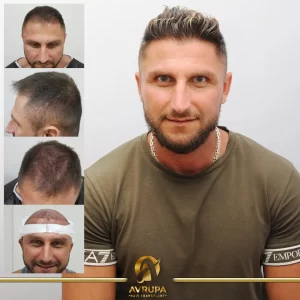
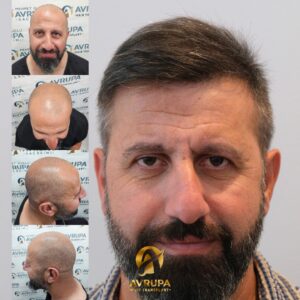
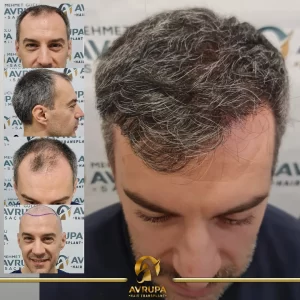
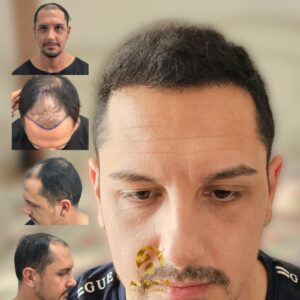
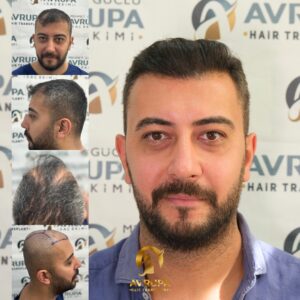
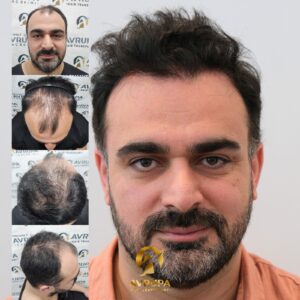
Timeline & Recovery
First 14 Days
- Day 1: Consultation & check-ups
- Day 2: Surgery
- Day 3: First wash
- Sleep with head elevated; avoid pressure, sweating, and sun
- Scabs shed by Day 10–14 (follow washing protocol)
Months 1–12
- Weeks 2–6: Temporary shedding is normal
- Months 3–4: Early growth; texture may be fine
- Months 6–9: Thickness and density improve
- Month 12: Final result for most patients
Risks & Safety
FUE is a surgical procedure. In experienced hands, serious complications are rare, but all surgery carries risk.
- Common, manageable issues: swelling, temporary numbness, crusting, shock loss
- Less common: folliculitis, donor over-harvesting, unnatural angles if unskilled
- Mitigation: sterile technique, conservative donor planning, surgeon-led implantation, clear aftercare
Travel Logistics (Istanbul)
- Stay: 3–4 days is typical; some prefer an extra day before flying back
- Airports: IST and SAW; ask for included transfers
- Best months: Year-round; avoid peak sun exposure right after surgery
- Language: English-speaking coordinators available
Ready to Plan Your FUE in Turkey?
Get a graft estimate, density plan, and clear quote—reviewed by our lead surgeon. We’ll confirm who performs each surgical step and share relevant before-after cases.
FAQs
How much does an FUE hair transplant cost in Turkey?
Typical all-inclusive packages range from about $2,000–$5,000+, depending on surgeon involvement, graft count, technique refinements, and inclusions. Compare detailed proposals—not just the headline price.
How many days should I plan for?
Plan 3–4 days: Day 1 consultation/labs, Day 2 surgery, Day 3 first wash. Many patients fly home Day 3 or 4.
Is FUE suitable for afro-textured hair?
Yes, with an experienced team. Curved follicle paths require careful punch control and graft handling. Ask for similar cases and confirm who performs harvesting and implantation.
When will I see results?
Early growth typically appears by Months 3–4; most patients reach final density by around 12 months.
Do you offer financing or staged sessions?
Yes, depending on medical suitability and donor capacity. Your surgeon will discuss one-vs-two-stage plans for larger areas or crown work.
Bottom line
Build your decision on surgeon involvement, donor planning, and aftercare—not price alone. Turkey can deliver excellent FUE outcomes when you choose a medically led team with transparent protocols and relevant cases. Start with a free analysis, get a written plan for who does what, and compare like-for-like packages.